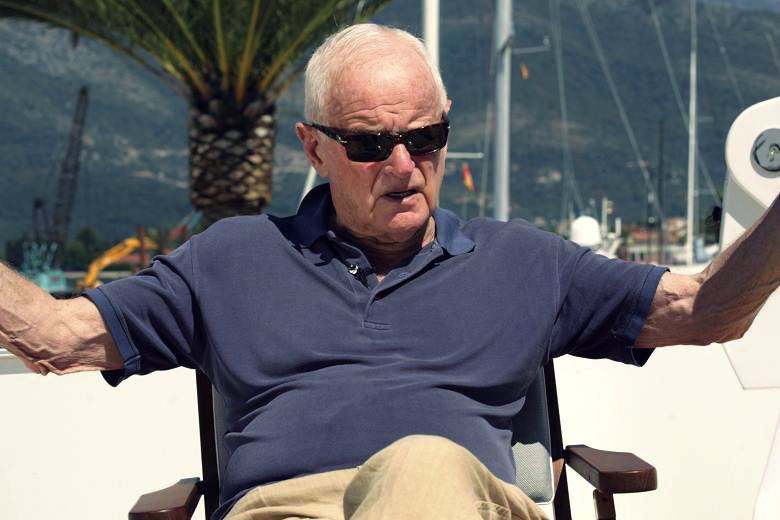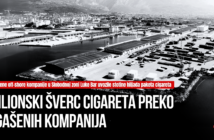Official data contradict the Government and Peter Munk’s statement of €400 million invested
The Adriatic Marinas company, which manages the Porto Montenegro marina in Tivat, did not bring a single cent of income tax to the state budget last year. As it is shown in the analysis of MANS Investigation Center, based on official financial reports of the Tivat-based company, Adriatic Marinas had an uncovered loss of €38.6 million.
At the same time, despite the claims that Adriatic Marinas invested over €400 million in the project, company’s financial statements for 2015 show the value of “real estate, facility and equipment” of mere €89 million, while the company employed 134 workers.
In October 2006, the former Army Depot was sold to a company owned by the Canadian billionaire Peter Munk, who earlier this month withdrew from the entire transaction, leaving the Porto Montenegro project to an Investment Fund from Dubai, under conditions that have not been publicly disclosed. Yet, Canadian media quoted unofficial information that Munk sold the marina for at least €200 million.
The Army Depot was sold to Munk for €3.2 million. The buyer committed to provide additional €15 million for the welfare program and severance payments to employees, while within four years, he would invest at least €106 million into the Tivat marina.
In July 2014, the government issued a certificate on implementation of the minimum investment commitments to the company belonging to the Canadian billionaire. The certificate stated that the investments amounted to a little over €164 million, while the management of Adriatic Marinas argued that they had invested over €400 million. However, at the end of last year, Munk’s company showed that the value of “property, facilities and equipment” were €89 million. Therefore, it is not known what the true value of the investment was.
It is known, however, that the government, selling the Army Depot Tivat, guaranteed to the Canadian billionaire a number of benefits, such as leasing the location for 90 years, or spatial planning in accordance with investor requirements and declaring it a free zone (which means that the fuel for yachts is free from taxes, custom and excise duties), as well as reducing the rate of VAT on services in marinas to only seven percent.
Thus, the state has given up substantial fiscal revenue, which would allow the Porto Montenegro marina to be more competitive than any other marina in the region, and its owner to earn a significant income.
Data from the financial statements of Adriatic Marinas show that in the period of seven years, from 2009 to the end of last year, it generated the revenue of around €120 million. At the same time, two other affiliated company – Adriatic Marinas Services, which was closed down late last year, and Porto Montenegro Facilities Management, showed the income of at least €34.7 million in previous years, but it is not clear whether this sum is included in the consolidated report of Adriatic Marinas.
When it comes to employment, at the end of last year, Adriatic Marinas employed 134 workers, while the two related companies – Porto Montenegro Facilities Management and Porto Montenegro – employed additional 72 workers, making it the total of 206 employees. Adriatic Marinas Services, which was liquidated, at the end of 2014 officially had 5 employees.
All those financial and employment data negate the government’s assessment that the Porto Montenegro project is one of the most successful privatizations in the country in the last decade, especially when one takes into account that the former military Army Depot in Tivat in mid-2005 employed nearly 500 workers. What cannot be denied is that the state renounced the significant tax revenues and that its benefits were very limited, while on the other hand, the one who actually benefitted from the Porto Montenegro project was the foreign investor.
Munk on Djukanovic: „I love that man“
Canadian billionaire Peter Munk revealed that in mid-2008 his business partner, the Russian oligarch Oleg Deripaska, “opened the door” for the project in Tivat.
At the time, in an interview for the Canadian newspaper “Globe and Mail” Munk said that four years earlier a friend had suggested him to invest in Montenegro. He then called the Canadian Ambassador in Belgrade, who told him that Montenegro would soon become an independent country, the new Monaco.
Mank then called his business partner Deripaska, who spoke by phone with the Montenegrin Prime Minister Milo Djukanovic. Soon afterwards, he was on a plane belonging to the Montenegrin government. He saw Tivat and decided to invest. “I love that man,” said Mank about Milo Djukanovic.
The privatization contract on buying, selling and investing in the military assets of the Naval Repair Institute “Sava Kovacevic” Tivat and Dom vojske Tivat is one of the few which have Djukanovic’s signature on them.
From Munk’s interview in 2008 to date, Montenegro has not become Monaco, Deripaska has initiated several arbitration proceedings against Montenegro because of a dispute with the government regarding the privatization of the Aluminum Plant in Podgorica, while the Canadian billionaire, meanwhile, has decided to “weigh anchor” from Tivat.
According to media information, Mank had a majority stake in Porto Montenegro, while his partners in business were his son Anthony, the Rothschild family, French billionaire Bernard Arnault, Deripaska…
This text is created with the support of the European Union within the project “Zero Tolerance to Corruption”. Network for Affirmation of Non-Governmental Sector – MANS is solely responsible for the contents of this article, and the views taken herein shall not in any case be considered as those of the European Union.




